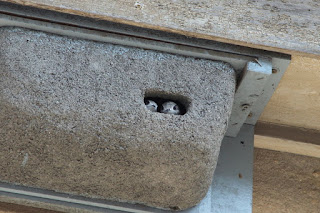The Common Swift is not so common in the UK anymore
The common swift (Apus apus) was once an aptly named bird, so often seen screaming and screeching as it swooped and soared over our streets but this is no longer the case. The common swift is no longer common in the UK. My father Bill, who lives in Cardiff, used to keep a diary in which he recorded the dates the swifts arrived each year at the start of summer. He no longer bothers because no swifts arrive where he lives any more. He often rightly complains that these once common birds have vanished from the road he lives in.
The common swift's British breeding populations are known to have dropped drastically in numbers, and the RSPB have the bird on the "Amber List" for species in danger.
So where have all the swifts gone? What has happened to them and what can be done about it?
One of the main reasons for their serious decline is how houses are being built and maintained today. In old buildings the swifts used to nest under the eaves but now roofs are sealed and the birds cannot find any way of entering or anywhere to nest. Renovations to old houses are sealing the roofs too. Making the problem worse, is the fact that swifts like to return to buildings where they have nested before, and they are not keen on newly built housing. Demolition of old buildings demolishes the nesting sites used by swifts.
Swiftlets in nest box (Photo: Public Domain)
Fortunately, there is a solution. Nest boxes can be placed on houses and buildings and access to roofs can be left by people who care about the conservation of these summer visitors. One group that is actively monitoring the swift population in the UK is aptly named Action For Swifts. It is reassuring to know that there are people all over Britain that are very concerned about this problem and who are taking action to try and do something about it before it is too late. I emailed a contact I found for Action For Swifts in the Cardiff area and was delighted to receive a reply from a lady called Julia. She confirmed what my Dad had been saying, that the situation for swifts in Cardiff is not good. But she informed me that there are a couple of known colonies in the suburbs of Canton and Cathays, and that Cardiff University is helping with conservation measures to help the common swift. The university has accepted advice on renovation work that is swift-friendly and has put up a large number of nest boxes on its halls of residence.
"Swift City"
Julia informed me that “Glamorgan Bird Club is also doing a variety of things, including raising awareness and has recently installed nest boxes in a church tower in the Vale.
And the RSPB is looking to make Cardiff a "swift city" - to work with the Council, house builders, etc, to increase nest sites, amongst other things.”
My father was very glad to hear this news and spread the word to a group of local radio amateurs he is friendly with. Obviously, the more people that know about the threat to the common swift and what steps can be taken to help them recover, the better it will be for these amazing birds.
Why Swifts are truly remarkable birds
Common swifts are truly incredible for many reasons. They have very short legs and because of this they are unhappy when landed because they are unable to walk. They use their short legs and feet to cling to vertical surfaces, such as the wall of a house. Because they do not land on the ground, the birds spend most of their lives on the wing and they even sleep when flying. Non-breeding young birds can spend as much as 10 months of a year in continuous flight. No other bird spends as much time on the wing.
Speaking of flight, swifts migrate all the way to and from equatorial Africa, all the way to the UK and many other parts of Europe and the Northern Hemisphere.
Swifts gather their nesting materials on the wing too, using feathers and small bits of vegetable matter that they find blowing about. They bond it together to make their nests using their saliva as an adhesive.
A remarkable bird, I am sure you will agree, so let’s do all we can to make the common swift, common again!


No comments:
Post a Comment